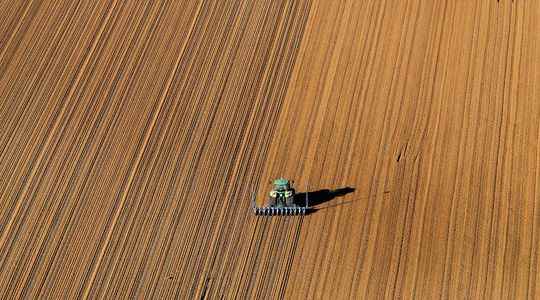“We sowed what we had to sow, for the moment our ‘assets’ are underground and protected, but if Russia decides to bomb heavily and send in tanks, this will obviously have an impact on the crops. “, confides Guillaume James, director of the investment holding Gravitation created by the businessman Charles Beigbeider, and shareholder of the company AgroGeneration, which today cultivates 120,000 hectares of cereals and oilseeds on the chernozom Ukrainian, one of the most fertile soils on the planet.
A concern shared by all professionals in agricultural raw materials, whether or not they are present on site. Proof of this excitement, prices have soared in recent days, like the ton of wheat, which reached the historic mark of 344 euros shortly after the outbreak of hostilities. For good reason, Russia and Ukraine alone account for almost 30% of world wheat exports, and the two countries are also essential on the market for corn, barley, sunflower and rapeseed. “Agricultural markets have always been extremely sensitive to geopolitical upheavals, but we are talking here about two superpowers in the sector”, summarizes Sébastien Abis, director of the Demeter business club and associate researcher at the Institute of international and strategic relations.
Sanctions and counter-sanctions
If the markets are soaring, it is also and above all that they fear the backlash of the economic sanctions imposed by Western countries to temper the belligerent attitude of Vladimir Putin. For the moment, agricultural commodities are not targeted by these retaliatory measures, but everything could quickly change in the event of an escalation. The threat to disconnect Russia from the Swift interbank network, the most widely used financial information transfer system in the world, and from severe export controls has already been brandished. “If these threats were carried out, they would destabilize all commodity markets, not just agricultural ones,” warns Benjamin Louvet, commodity manager at OFI AM.
Many industrialists have their eyes riveted on this conflict, while Russia is the second largest aluminum producer on the planet, the same for nickel, and takes over almost half of the world’s palladium production. . “Three essential metals in the race for climate transition committed to the floor by Europe”, points out Catherine Karyotis, professor of finance at Neoma Business School. “To compensate for the overweight of the batteries and gain autonomy, an electric car consumes 45% more aluminum – much lighter than steel – than a thermal car. A metal also used to make the frames of photovoltaic panels” , adds Benjamin Bouvet. Nickel is a key ingredient in the chemistry of electric batteries, while palladium, one of the most expensive precious metals in the world, is used to manufacture catalytic converters for gasoline vehicles. If Russian exports were curtailed or if Moscow itself decided to turn off the tap to respond to Western sanctions, there is no doubt that the green shift would suffer.
Markets already under tension by the Covid crisis
Especially since the war in Ukraine has hit a raw materials market already put under pressure by a health crisis which has turned a Meccano of world trade usually regulated to the millimeter upside down. For some, this crisis can and must push Europe out of its dangerous dependence on Russia. Certainly. But easier said than done. “To open and commission a new mine, it takes seven years,” says Benjamin Louvet. “And if man can become a producer overnight, this is not the case with the earth”, continues Guillaume James.
For many economists, this crisis, which is fanning the already bright flames of the commodity markets, will precipitate us into a new supercycle. Clearly, a rise that should last at least a decade, like that of the 2000s, driven at the time by the urbanization of China. Supercycle or not, the Russian onslaught will drive up prices even further, fueling inflation already at its highest in twenty-five years in the euro zone.
